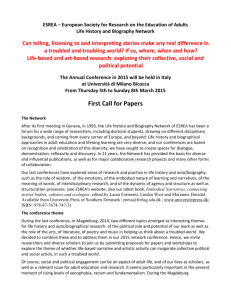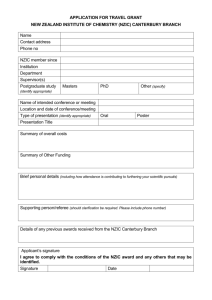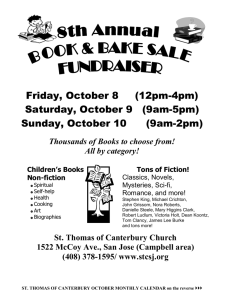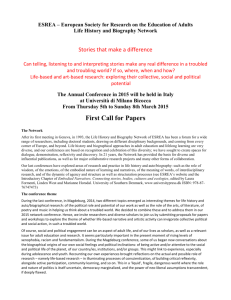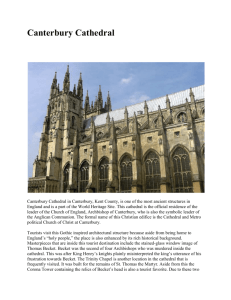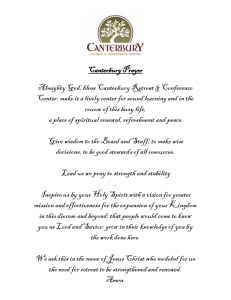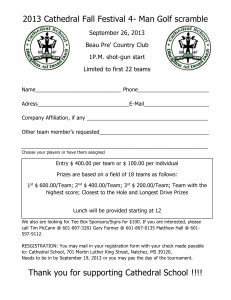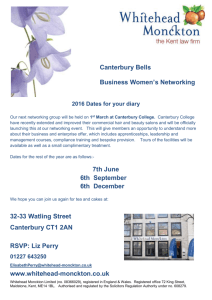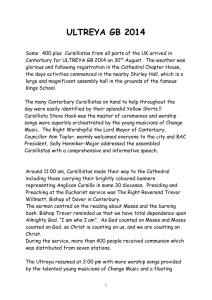The 2016 conference of ESREA research network of Life History and
advertisement
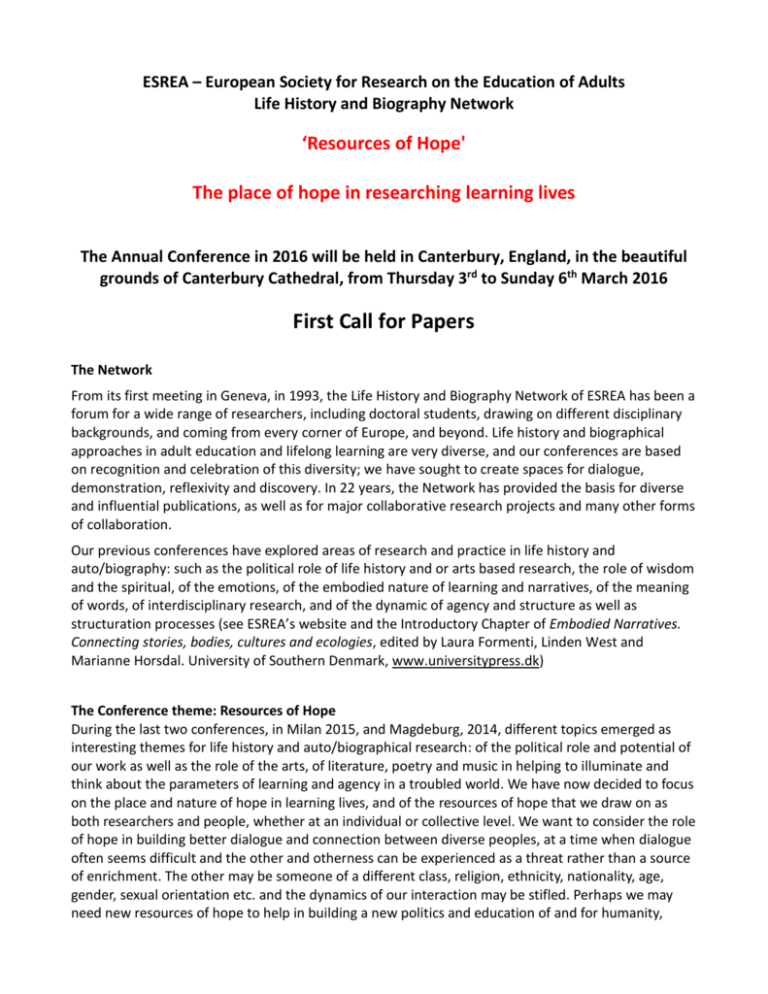
ESREA – European Society for Research on the Education of Adults Life History and Biography Network ‘Resources of Hope' The place of hope in researching learning lives The Annual Conference in 2016 will be held in Canterbury, England, in the beautiful grounds of Canterbury Cathedral, from Thursday 3rd to Sunday 6th March 2016 First Call for Papers The Network From its first meeting in Geneva, in 1993, the Life History and Biography Network of ESREA has been a forum for a wide range of researchers, including doctoral students, drawing on different disciplinary backgrounds, and coming from every corner of Europe, and beyond. Life history and biographical approaches in adult education and lifelong learning are very diverse, and our conferences are based on recognition and celebration of this diversity; we have sought to create spaces for dialogue, demonstration, reflexivity and discovery. In 22 years, the Network has provided the basis for diverse and influential publications, as well as for major collaborative research projects and many other forms of collaboration. Our previous conferences have explored areas of research and practice in life history and auto/biography: such as the political role of life history and or arts based research, the role of wisdom and the spiritual, of the emotions, of the embodied nature of learning and narratives, of the meaning of words, of interdisciplinary research, and of the dynamic of agency and structure as well as structuration processes (see ESREA’s website and the Introductory Chapter of Embodied Narratives. Connecting stories, bodies, cultures and ecologies, edited by Laura Formenti, Linden West and Marianne Horsdal. University of Southern Denmark, www.universitypress.dk) The Conference theme: Resources of Hope During the last two conferences, in Milan 2015, and Magdeburg, 2014, different topics emerged as interesting themes for life history and auto/biographical research: of the political role and potential of our work as well as the role of the arts, of literature, poetry and music in helping to illuminate and think about the parameters of learning and agency in a troubled world. We have now decided to focus on the place and nature of hope in learning lives, and of the resources of hope that we draw on as both researchers and people, whether at an individual or collective level. We want to consider the role of hope in building better dialogue and connection between diverse peoples, at a time when dialogue often seems difficult and the other and otherness can be experienced as a threat rather than a source of enrichment. The other may be someone of a different class, religion, ethnicity, nationality, age, gender, sexual orientation etc. and the dynamics of our interaction may be stifled. Perhaps we may need new resources of hope to help in building a new politics and education of and for humanity, across difference; and for strengthening democratic processes in contexts of diversity. For over 40 years the emphasis has been on dialect, on what is distinct, of empowering the marginalized and neglected; this continues to be important, yet we might also need attention to be paid to what we share in common, as human beings, and how we can build resources of hope collectively at a global, national and local level. It was the British cultural theorist and adult educator Raymond Williams who coined the phrase ‘resources of hope’, and whose inspiration continues to be alive today. Williams had been deeply involved in workers’ or popular education in the United Kingdom, which was an alliance between workers organisations and progressive elements in universities. A mix of Enlightenment idealism, faith in reason, as well as, for others, like R.H. Tawney, religious belief in the potential divinity in everyone, characterised this movement and its aspirations towards democratic socialism. Here was a tradition that played a key role in envisioning and building the welfare state after the Second World War (Rose, 2010). Moreover, such popular education could model, in microcosm, the good, fraternal and more egalitarian, democratic society that many aspired to. The experience shaped Williams’ own conviction that spaces were needed across civil society in which people could learn openness and respect for each other and for different perspectives. Where all partialities of opinion could enter in a spirit of intellectual challenge and social purpose, combined with respect and humanity. The generation of resources of hope was, in such terms, no easy, flabby, limited academic affair. It was a questioning, challenging and troubling space, in the company of people who, despite differences, could sometimes become friends. It was a quest for something better in which human agency rather than economics per se had a central role. A focus on the nature and role of hope, within life histories, may inevitably include aspirations towards a better and perhaps more peaceful life. This may be particularly appropriate for us today in the context of rising levels of xenophobia, racism and fundamentalism. During both the Magdeburg and Milan conferences, a number of us began new conversations about the biographical origins of what we thought to be essential for the good life, and the good society: which included being attentive to the social and political life of the planet, of our country/ies, institutions, and/or groups. This might link, in turn, to our experiences during childhood, adolescence, youth and adulthood, where resources of hope were created: perhaps by a teacher, in political movements, in a spiritual encounter or by falling in love with literature. Hope of course plays an important role in religious and spiritual communities: the hope of a better future, perhaps, or of redemption, or of finding resources of hope in giving to others. We want to create a space where we might think about such experience together, however different our understanding might be: to seek to illuminate where resources of hope can lie, and how we make sense of them, whether in the lives of those with whom we research, or in our own lives, when thinking auto/biographically. Some questions What resources of hope are foregrounded in our research? What resources of hope have been important in our own lives? Can life-based or narrative research itself offer resources of hope, and if so how and why? Resources of hope, as noted, can take other forms: Raymond Williams himself saw great potential in new forms of communication technologies, and their capacity not only for educational activity but also for experimenting and experiencing forms of self-government. Resources of hope might, in short, be partly digital: in the interplay of diverse communities, local and global; and in a determination to occupy or reclaim parks, halls, schools, universities, churches, synagogues and mosques for building horizontal forms of dialogue, learning and decision making. Life-histories and auto/biographies also represent potential sites of innovation, for transformative learning, for community and political action, in diverse settings as well as for, at a different level, experience, perhaps, of the numinous and sacred. In such terms researching lives goes far beyond “pure research” - or a detached view of academic research in an ivory tower – towards a highly nuanced as well as subjectivist sensibility. The conference seeks to build dialogue around this theme, and differing ways of understanding it: between those who may see the issue as to do with challenging oppression in the secular world and securing control over processes of production and or reproduction; or those who think the spiritual, or even the religious, is a crucial resource of hope (not least given the location of our conference in the Cathedral grounds). We will also be attentive to weaving into our work previous themes of our conferences: embodiment and narrative, critical reflection, social change, agency. One goal of this conference is to encourage all participants to reflect on their research and to ask themselves about the meaning of hope, at both a social and maybe a more intimate and individual level, as well as methodologically: where hope might lie, in short, in the business of doing research itself, in its myriad forms and dimensions. Issues for the conference to address: Where and why do we see the most important resources of hope to lie: in intimate or social life, in private, sacred spaces, or in material relationships and democratic experience? Or all of these dimensions? What are the resources of hope that enable people to keep on keeping on, or for transformation? Can the sites of adult education survive the colonisation of space by dominant economic agendas and the grip of homo economicus? Do teachers and learners have the same resources of hope in an era of audit and commodification? Is hope a motivator towards adult learning and is education necessarily a source of hope? What are the potential manifestations and implications of hopelessness? Can hope become a delusional fantasy or a denial of reality in an increasingly divided and troubled world? Our Scientific Committee Laura Formenti, Linden West (conveners of the Network) Alan Bainbridge, Michel Alhadeff-Jones, Jean-Michel Baudouin, Agnieszka Bron, Francesco Cappa, Bettina Dausien, Rob Evans, Barbara Merrill, José Gonzalez Monteagudo, Hazel Reid, Elisabetta Biffi. Members of the Scientific Committee come from Austria, Italy, Germany, Spain, Sweden, Switzerland, and the United Kingdom; the Anglophone Francophone and German speaking worlds as well as other language communities. All of us have been active in the Network and in ESREA for some time, and we are committed to create a learning community and to offer good critical space for younger and older researchers. The location of the Conference The conference will be held in the beautiful settings of the Cathedral Lodge within the precincts of Canterbury Cathedral, in the centre of this ancient city. A cathedral has existed on this site for over 1300 years, while some of its Deans and Archbishops have been passionately interested in adult education, in the broadest sense, and in ideas of social justice. The building is used for courses and conferences. The Cathedral Lodge offers attractive accommodation and there are many other hotels and guest houses nearby. Deadline for submission of abstracts for papers and proposals for symposia/workshops: 12th October 2015 Please send your proposals to: gill.harrison@canterbury.ac.uk Abstracts (WORD format) should have no more than 500 words, Times New Roman, 12 points. The title of the abstract should be clear. Your name, institutional affiliation, phone and email should NOT be included in the abstract, but be on a separate page. Proposals will be blind reviewed; acceptance will be announced by mid November 2015 and people will be informed about the range of papers and symposia, so as to think about whom they might wish to talk to prior to the conference, and or present together, or form a symposium panel or round table. Final papers (3000 – 5000 words) should be submitted by 31st January 2016 Detailed guidelines for paper, symposium, roundtable and workshop submissions, as well as the programme of the Conference will be made available later on the conference website. Conference languages are English and French ESREA's language policy is inclusive. Abstracts for the peer-review process must be in English or French. Papers and presentations in the conference will be welcome in French as well as English. Where possible, a short (1000-1500 word) summary in English should be provided. For French, German, Italian speakers (and for all others): slides in English or bilingual are recommended. English speakers are asked, where possible, to provide bilingual versions (in French and English) of their slides. We will not have professional translation during the conference, since we prefer to use the linguistic skills and goodwill of colleagues to facilitate dialogue. Tolerance, respect, mutual support and curiosity will do the rest. It is important to recognise that speakers requiring some element of translation or explanation must accept that they can say less in the allotted time: they should plan for this, perhaps by providing essential information in the form of a hand-out, for example. For further information, please write to: Professor Laura Formenti: laura.formenti@unimib.it; or Professor Linden West: linden.west@canterbury.ac.uk; or gill.harrison@canterbury.ac.uk Revised 20th May 2015

